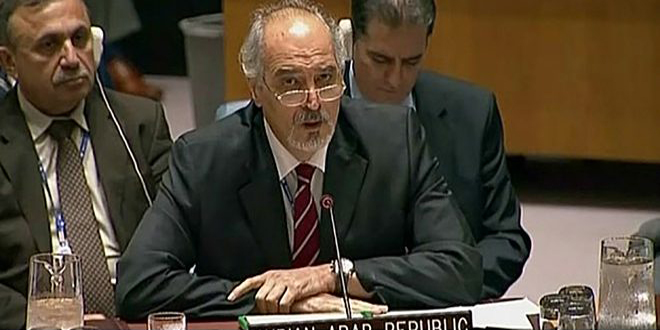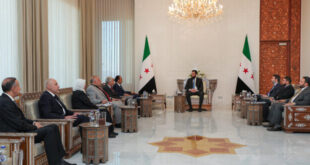New York, SANA- Syria’s Permanent Representative to the UN Bashar al-Jaafari stressed that since the beginning of the terrorist war imposed on Syria, the Syrian Government has been keen on delivering aid to those who deserve it in cooperation with the UN and the affiliated agencies.
Speaking at a session of the UN Security Council on the humanitarian situation in Syria, al-Jaafari said “comparing the briefings presented by some representatives with other ones show that some of the representatives know what is taking place in Syria and they are following up the development of the situation there while others are depending mainly on sayings, allegations and intelligence and media disputes which give the impression that what is taking place in Syria isn’t related to combating terrorism and that there is a humanitarian crisis in Syria caused by the Syrian Government.”
He affirmed Syria’s readiness to cooperate with any honest effort that aims at handling the consequences of the humanitarian situation in Syria since the goal behind it is helping the Syrian people away from exploiting their pain to achieve rejected political agendas of interference.
He added that the Syrian Government, since the beginning of the terrorist war imposed against it, has been keen on delivering aid to those who deserve it in cooperation with the UN and the affiliated agencies based on the principles which organize the humanitarian work, indicating that Under-Secretary-General for Humanitarian Affairs Mark Lowcock committed a mistake today when he didn’t speak about the cooperation with the Syrian Government, “as if OCHA is dealing with ghosts in Syria and not with the an existing government.”
Al-Jaafari affirmed that it is the time to acknowledge that the main reason behind the crisis is the emergence and spread of the terrorist organizations, on top ISIS and Jabhat al-Nusra and the affiliated groups, in addition to imposing coercive unilateral sanctions on the Syrian people in a way that made their life difficult and increased their suffering on the economic, social, humanitarian and health levels.
He added that the US Representative said that her country allocated USD 860 million to spend them on the Syrian refugees in the hosting countries namely Jordan, Turkey and Lebanon, wondering why the US government doesn’t spend this money to allow the refugees to return to their country to rebuild the schools, hospitals and roads instead of continuing the pressures to make these refugees stay outside their homeland.
“We met Lowcok few days ago and we expressed to him clearly the concerns of the Syrian government and its notices on the performance of “OCHA” over the past stage based on the keenness of the government on building a professional, transparent and objective relation that would lead to achieving the basic goal which is meeting the needs of the Syrian people and providing the humanitarian aid to all the needy, in addition to rehabilitating the infrastructure to allow the displaced to return to their areas,” al-Jaafari said.
He clarified that the relation which Syria seeks to establish with the UN and the affiliated humanitarian institutions should be a legal one that respects the principles which organize the humanitarian work and it should be an ethical relation that doesn’t politicize the humanitarian file and doesn’t use it to exert pressure on the Syrian Government, adding that this relation must be also realistic and it should admit that the main reason behind the suffering of the Syrian people is the international terrorism and the unjust coercive measures imposed on them by the US, EU and other states.
He asserted that the relation must also be built on rejecting the exploitation of the humanitarian situation in Syria to implement certain political agendas and should admit that the donor conferences are just a show as the percentage of the funding hasn’t exceeded 33 percent till now.
“This relation which I am taking about is a relation that should only aims at alleviating the suffering of the Syrians…It should be a relation based on mutual trust, partnership, cooperation, dialogue, professionalism and reliability and not on imposing conditions and dictations in a way that violates the sovereignty of Syria,” al-Jaafari said.
He added that recently the Syrian government has agreed on a proposal by the Resident Coordinator on establishing the tripartite mechanism that embraces representatives of the Syrian Government, the Russian side and the UN with the aim of enhancing cooperation among the parties which support the humanitarian work in Syria to the implement the humanitarian programs which have been agreed upon.
Al-Jaafari added that the Syrian Government reiterates that the humanitarian aid shouldn’t only be sent to the unstable areas, but it should also cover the areas liberated from terrorism by the Syrian Arab Army and the forces of the friends and allies, particularly in Deir Ezzor province and the eastern part of Aleppo and other areas, saying “we highly appreciate the significant aid provided by Russia and Iran.”
He went on saying “some want to fight Russia in Syria or to fight Iran in Syria and to fight our allies in Syria…This is shameful as it violates the international law and the provisions of the UN Charter.”
He reiterated that the policy of the Syrian state since the beginning of the crisis has been built on two bases which are combating terrorism and finding a political solution to the crisis that would stop the bloodshed and restore stability and security.
Al-Jaafari went on to say that the Syrian government showed seriousness and commitment to Astana and Geneva tracks.
He added that Syria has positively considered the Astana track, hoping to reach real cessation of hostilities in the country and to separate the terrorist groups such as ISIS, Jabhat al-Nusra and other terrorist groups from those which agreed on entering Astana track.
He reiterated the Syrian Government’s commitment to Geneva process as the Syrian Arab Republic delegation has seriously and responsibly participated in all rounds of talks, noting that “We have recently held useful round of talks with the UN special envoy and his team as the meeting focused on two topics which are countering terrorism and the meetings of the constitutional and law experts.
Al-Jaafari stressed Syria’s stances towards continuing fighting terrorism in all Syrian territories, asserting that the only solution to the crisis in Syria is a political one that is based on the intra-Syrian dialogue led by Syria and far from any foreign interference or preconditions.
In response on the US representative’s briefing, al-Jaafari referred to the secret documents that were exchanged between the US Department of State in Washington and the US Ambassador in Damascus in 2006 which included a scheme to undermine the government in Syria.
Al-Jaafari pointed out the scandal of the American invasion of Iraq and its repercussions on the region and on Iraq, accusing the US Pentagon of the formation of the Military Operations Center (MOC ) in Amman, Jordan, since the beginning of the crisis in Syria with the aim of training the terrorists and sending them across the borders to Syria.
The US-European behavior towards what is going on in Syria violates all international resolutions on Syria and the US Government should know that we are a sovereign state and we don’t want to fight it, but it should change its wrong policy towards us, al-Jaafari said.
He called for lifting the coercive unilateral economic measures imposed on Syria to enable the Syrian refugees to return back to their country, indicating that the political solution should be based on helping the Syrian government not working against it and exploiting the humanitarian file as a means for putting pressure on it.
For his part, Russian permanent representative to the UN Vasily Nebenzya called for lifting the coercive unilateral economic measures imposed on Syrian people, noting that those measures are “collective punishment” of the Syrian people and they should be ended immediately.
In another context, Nebenzya reiterated the temporary nature of the de-escalation zones in Syria, noting that it is unacceptable to claim that the establishment of the de-escalation zones aims at partitioning Syria; therefore we confirmed the temporary nature of those zones.
H. Zain/R.J/Ghossoun
 Syrian Arab News Agency S A N A
Syrian Arab News Agency S A N A

